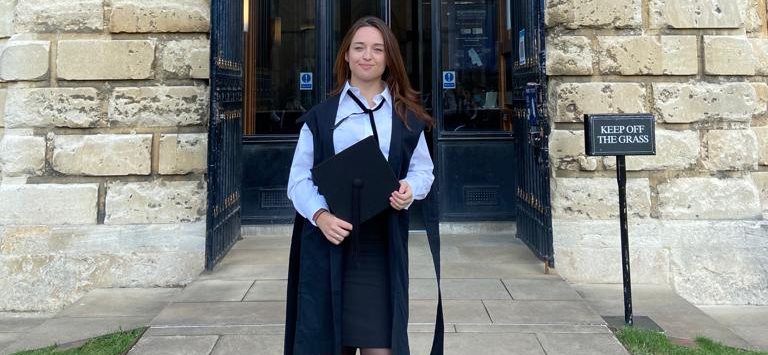BSMS student Emma Taylor-Gallardo received a prestigious and highly competitive scholarship from the Nuffield Department of Population Health, University of Oxford, to study for the MSc in Global Health Science and Epidemiology from October 2021 to September 2022.
The Nuffield Department of Population Health Studentship was awarded to Emma in conjunction with St Cross college to cover the full cost of tuition fees and a grant for living expenses. Read our Q&A with Emma to find out more about this scholarship and her experiences as an intercalating student.

Emma Taylor-Gallardo
What was the scholarship application process like?
I remember looking into funding options when I applied to the course and being eligible for relatively few scholarships. I found a summary document for a scholarship that was last awarded in 2019 and thought it would be a good way to structure my personal statement. I structured my statement around these guidelines and tried to give examples to demonstrate key attributes including research experience and outreach work.
I prepared for my interview by looking into the course structure and department, including their current areas of research and how they overlapped with my own interest in cancer epidemiology.
During the interview I was able to talk about my involvement with various projects and societies at BSMS and my summer research project (Junior Research Associate) looking into pancreatic cancer epidemiology. With encouragement from my supervisor, Professor Anjum Memon, and student mentor, Dr Peter Bannister, I submitted a poster I subsequently presented at the National Cancer Research Institute annual conference in November 2020.
How did you react when you were successful?
I was thrilled to hear I had been awarded the scholarship, particularly since I was not aware I was being considered for one. It took a few days for it to sink in and quite a few emails checking they hadn't made a mistake.
It certainly eases the financial pressure and means I do not have to rely on a postgraduate loan (which would not even cover the full tuition fee), my savings and part time job. There is already so much to do in Oxford (studying and otherwise) without having to worry about a side hustle.
How is the MSc going so far?
The people I have met in Oxford have been incredible. Most of us on the MSc have very different backgrounds, both in terms of career/studies and nationalities. The course covers global health, epidemiology, research ethics and statistics. The course has been very statistics heavy so far and I've started learning how to code. Both of these are things I never really saw myself doing when I started medical school, but I'm very keen to bring the skills from this MSc into my future research and clinical practice.
The course directors are very keen to bring in guest speakers from different disciplines to host masterclasses to help us with networking and career progression. The workload is intense but fortunately in a different way to Medical School (I don't miss 7:30am surgical rotation starts). I am glad for a change of scenery from the hospital wards, but know that I will be all the more keen to return to studying medicine after this year away.
I am keen on becoming a clinical academic (split time between research and clinical practice), specialising in oncology. I hope to write my dissertation project with the Cancer Epidemiology Unit at Oxford, which should give me a good foundation for future cancer epidemiology research.
What made you decide to intercalate? And what advice would you have for any BSMS/medical student considering intercalating?
My advice to other students considering Intercalation is to think of what you'd like to be doing alongside your medical career (or even instead of) and approach people in that position. Talk to students at BSMS that have intercalated and ask them about their experience of a particular course or university, and don't feel shy messaging people on LinkedIn with a few questions. Having come directly to medicine at 18, I feel that this year away from medicine is allowing me to let my hair down and explore my other interests. Also, the idea of graduating as a doctor at 23 was more than a little daunting, so I wanted to give myself some time and life experience before starting that phase of my life.
What support did you get from BSMS?
BSMS was very supportive in my decision to intercalate. Dr Harry Witchel and students host Intercalation events at the beginning of 3rd year (open to keen 1st and 2nd years too) where you can learn about what Intercalation is, an overview of the application process and talks about different courses (both at BSMS and some external opportunities too).
I have found it fairly easy to participate in research activities and extracurricular events at BSMS, but would say that I found it hard to keep onto of these during my 3rd year due to the demands of the clinical timetable.
I was very fortunate to receive references from prominent staff members at BSMS including the Dean, Professor Malcom Reed, Dr Harry Witchel and Professor Anjum Memon. I would particularly like to thank Professor Anjum Memon for being my supervisor and cheerleader. He has provided me with invaluable mentorship and opportunities, so thank you Anjum!
Find out more about intercalating here >